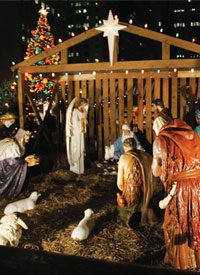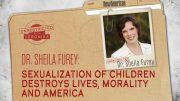
Imagine, if you will, a gala birthday party given in your honor. The guests will sing, dance, give presents, eat, drink, and have the merriest of times. The hitch: your name will not be mentioned, the gifts will not be for you, the celebrants won’t be thinking about you, and everyone would sort of prefer that you not come.
That’s all that will be left of Christmas if various groups have their way. All across the country, this year as in the past several years, there has been a concerted drive to remove all vestiges of Christianity from the celebration of Christ’s birthday. For example:
• Public schools increasingly call Christmas vacation something like "winter break."
• Students and teachers are discouraged or prohibited from wishing each other "Merry Christmas," preferring "Happy Holidays" or "Seasons Greetings" instead.
• Christmas trees are either banned or called "winter trees."
• Public-school Christmas programs, er, pardon me, "winter programs," go heavy on "Frosty the Snowman" and "Deck the Halls," but the traditional Christmas carols are censored.
• Retail store employees are instructed to wish their customers "Happy Holidays" or "Seasons Greetings" rather than "Merry Christmas."
• Retail catalogs tout their goods as perfect for "the season" but avoid mentioning Christ or Christmas.
• Christmas cards, if I may call them that, wish our friends the "joys of the season" but commonly omit the "Reason for the season."
• Public buildings such as city halls, fire and police departments, etc., feature holiday displays with holly, reindeer, and candy canes, but no manger scenes and no Baby Jesus.
These practices are far from universal. But they are increasing, and they are part of a concerted drive to cleanse the public arena from any and all vestiges of America’s Judeo-Christian heritage.
Capitulation
Sometimes this is done by public officials who are themselves hostile to Christianity and the Bible. But I would like to think most are motivated by other considerations.
Sometimes officials secularize the public arena because they don’t want to offend anyone, and somehow they think they can avoid giving offense by reducing the holiday observance to the lowest common denominator. We need to remind these officials that we are offended when our heritage is stripped of its meaning. Secularism is also a belief system.
We must remember that the public sector has grown exponentially while the private sector has shrunk. Today the public arena is the main forum for the dissemination and discussion of ideas and issues: public elementary and secondary schools, public universities, public streets, public parks, public civic centers, public museums, public airwaves, and the like. The public arena has become the primary forum for the battle of ideas. If religious ideas are prohibited in the public arena but secular ideas are permitted, then religious expression and religious viewpoints are placed at a distinct disadvantage.
Other officials naively capitulate to the argument that the First Amendment mandates an absolute separation of church and state, and therefore any and all public religious observances are unconstitutional. In fact, the federal courts have said no such thing. In Florey v. Sioux Falls Independent School District, 619 F.2d 1311 (8th Cir. 1980), the 8th Circuit U.S. Court of Appeals ruled that public-school Christmas programs can include sacred carols so long as they are a balanced part of a general holiday observance. In Lynch v. Donnelly, 405 U.S. 668 (1984), the Supreme Court held that a nativity scene in front of a fire station in Nantucket, Rhode Island, did not violate the First Amendment. However, in County of Allegheny v. ACLU of Pittsburgh, 492 U.S. 573 (1989), the Supreme Court held 5-4 that a manger scene was unconstitutional but that a Jewish menorah did not violate the First Amendment. The court rationalized its decision by observing that the manger scene stood alone as an endorsement of Christianity, while the menorah was part of a general holiday display that included both sacred and secular symbols.
Now, almost all Americans believe in religious freedom, and hardly anyone in this country wants an established state church. But the pilgrims did not come to this country to get away from prayers at football games, and most Americans today do not believe a manger scene or a Christmas carol in the public arena constitutes an establishment of religion.
However, in recent years radical separationists have argued that a public religious practice or public display of a religious symbol endorses the religion of the majority and communicates a message to the minority that they are excluded from full participation in the life of the nation. In Glassroth v. Moore, the challenge to the Ten Commandments monument in the Alabama Judicial Building was based on the fact that the plaintiffs at times had to do business in the Judicial Building, that as they walked across the rotunda they might see the monument, and that this is offensive to them. But where does the Constitution say that I will never have to see anything that offends me? I am offended by the sculpture of Themis, the Greek goddess of law and justice, that stands in front of the federal court building in Montgomery. I am offended by markers erected with my tax dollars that tell my children the Earth is billions of years old or that certain hills and valleys were formed hundreds of millions of years ago. I am offended by public use of profanity and vulgarity. But exposure to that which offends us is part of the price we pay for living in a free society.
Syndicated columnist Don Feder describes himself as "a religious Jew who wants to put Christ back in Christmas." He says, "As a lad, I was bemused by a billboard sponsored by the Knights of Columbus, which urged the public to ‘Keep Christ in Christmas.’ I considered the appeal superfluous, as I could not conceive of the holiday devoid of Jesus."
He adds that he’s "entirely comfortable" with the concept of a Christian America, because "the morality of Christianity, though not necessarily its theology, is my morality. After all, Christians got their values from my Bible."
Saving Our Culture
As the "War on Christmas" continues, some are fighting back. Bill O’Reilly of Fox News has produced and is distributing "We Say MERRY CHRISTMAS" stickers for display on bumpers and in store windows. The American Family Association has circulated a questionnaire among leading retailers asking whether they intend to observe Christmas in their advertising, in their decorations, and in the way they instruct their sales personnel to talk with customers. The answers, as they come in, are posted on AFA’s website.
Like Fred Gaily, the attorney who defended Kris Kringle in Miracle on 34th Street, others are defending Christmas in court. The Becket Fund for Religious Liberty persuaded a federal judge in Cincinnati to dismiss a lawsuit that claimed that giving government employees a Christmas holiday is an unconstitutional establishment of religion. The Becket Fund also successfully represented nine-year-old Jonathan Morgan after Texas school officials prohibited him from bringing candy canes to a class Christmas party because the canes contained a religious message.
As in previous years, the Alliance Defense Fund has launched its Christmas Project, featuring lapel pins that say "Merry Christmas. It’s ok to say it." ADF sends out literature to public schools countering ACLU propaganda and explaining what the courts have permitted and prohibited concerning Christmas in the public arena. And they have successfully represented a Tennessee woman who was allowed to set up a nativity scene at a library but was then told she had to remove "inappropriate" figures such as Jesus, Mary, Joseph, and the Wise Men. The ADF forced Georgia school officials to back down from a policy prohibiting teachers from referring to celebrations as "Christmas parties," and they persuaded Illinois school officials to reinsert traditional carols into a school Christmas program after those officials, following erroneous advice, had ordered their removal.
For 2,000 years, the birth, death, and resurrection of Christ have been the central events of human history. Let us keep Christmas in our hearts, our homes, and the public square. To defend against the War on Christmas, let us each take the following steps:
• Choose your Christmas cards carefully, concentrating on the message. Don’t buy cards that just use that bubbleheaded phrase "Seasons Greetings," no matter how attractive they may be. And to have greater effect, tell the store manager why you’re not buying those cards.
• Find out what stores instruct their sales personnel not to say "Merry Christmas." Don’t patronize those stores, and tell the store managers why you refuse to shop there. Likewise, give positive reinforcement to those stores that do honor Christmas.
• At gatherings where Christmas songs are sung, to the extent that you have a voice, urge the singing of the traditional carols. And if those carols are sung, I wouldn’t object to a mix that includes nontraditional songs like "Chestnuts Roasting on an Open Fire" or even (gaahh!) "Please, Santa Baby."
• If you see situations in which you believe the Christmas message is unfairly censored, seek the advice of Christian legal defense organizations like the Alliance Defense Fund (alliancedefensefund.org, 800/TELL ADF), the Becket Fund (becketfund.org, 202-955-0098), or the Foundation for Moral Law (morallaw.org, 334-262-1245). And as you plan your year-end charitable giving, these organizations are worthy of your support.
• Without going out of our way to be offensive, let us proudly and joyfully say Merry Christmas to all. And for our friends of a different faith, it’s fine to add something like, "And Happy Hanukkah as well."
John Eidsmoe, a retired Air Force lieutenant colonel, is a professor at the Oak Brook College of Law & Government Policy and serves as legal counsel for the Foundation for Moral Law.
Photo: AP Images



